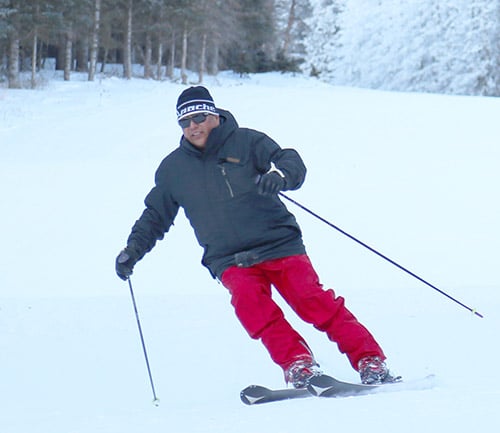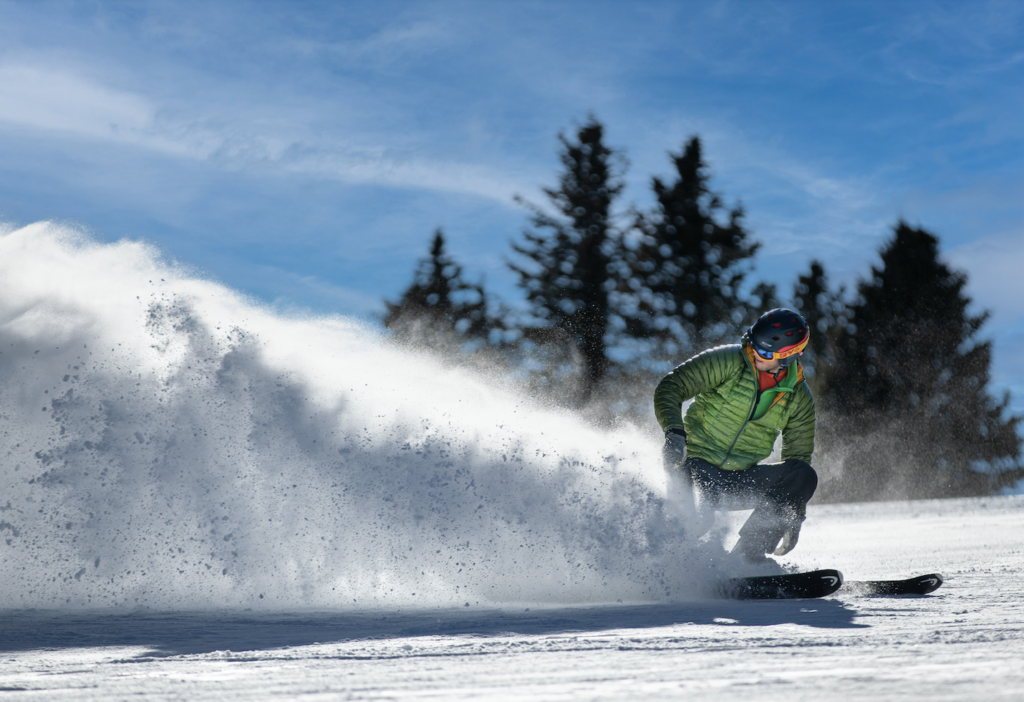Ski trips offer adventure in the great outdoors with a healthy dose of physical activity. Skiing helps to burn fat, boost your mood, and increase heart health. It’s a fun fitness activity to do solo or with friends, family, and significant others. Yet, it takes a bit of preparation, practice, and technique to become a seasoned skier.
For beginners, taking lessons can be very valuable. Professional instructors will teach you how to safely get on and off the ski lift, the proper skiing technique, mountain etiquette and more. Learning the proper techniques when you are first beginning will set you up for years of safe fun on the slopes.
1. Get the Right Gear
Getting the right clothing and equipment are essential beginner skier tips. You’ll need a winter weather wardrobe and gear that offers a perfect sized fit. This way you can have full mobility and more control while skiing downhill.
The first step is to layer up to stay warm. You’ll want a thermal base layer, comfy fleece, and a ski coat or jacket. Choose a waterproof and insulated material that also protects you from extreme temperatures.
Thermals with sweat-wicking technology can also help when exerting yourself on the slopes. Don’t forget to lather up with sunscreen to protect your skin as you’ll experience high altitudes and strong UVA rays when skiing during the winter.
Gloves, socks, and goggles are also must-have gear. It’s best for beginners to rent equipment, like a set of skis, poles, boots and a helmet.
This allows you to test out the equipment first. High-performance ski equipment can get expensive so it’s best to do this before you buy.
2. Take a Lesson
Professional ski instruction is one of the most important tips for first time skiing. This can be especially helpful when you are going with a group of seasoned skiers as you can learn from a trained expert, who also has the time and attention to teach you.
Most ski lodges offer private or group classes. Group sessions are a great opportunity to meet other skiers with the same level of experience.
Lessons can offer hands-on practice for learning the right techniques. You also get to go over safety instructions to reduce the risk of falling. This way you’ll feel better prepared and more comfortable with the equipment. For the best ski tips and to truly learn how to ski, lessons are vital in understanding this thrilling activity.
3. Do Some Prep Work
If it’s your first time skiing, you may want to consider exercising in advance as skiing is a full body workout that requires endurance.
Take some time before the trip to work on conditioning exercises. The more in shape you are, the easier it will be to master the techniques. You’ll also be able to recover your muscles faster.
Cardio is a great way to prepare you for a weekend of skiing. You should also place focus on strengthening your leg muscles. This will help you with balance and coordination while skiing.
4. Fuel Up and Stay Hydrated
You can burn an average of 250 calories in only 30 minutes of skiing. So, skiing for beginners can take a lot of energy and endurance.
This makes it important to stay hydrated and fill up on foods with sustenance. Choose snacks that provide you with energy and are high in protein and fiber. Nuts, granola bars, and fruit are smart choices for skiers.
5. Check the Trail Status
More tips for beginner skiers include always checking the daily trail status. It’s important for all levels of skiers to check the conditions before you set out.
These can alert you of any last minute closings or weather issues. You can also see how much snow is on the mountain and check the current forecast.
Be sure to check the difficulty levels for the mountain’s different trails. These often go from green to black, with green being the easiest, blue for intermediate riders and black for advanced. This way you can pick a few trails that are better suited for beginners.
Familiarize yourself with the trail map as well as the chairlift rotation and its operating hours. The more research you do, the more prepared you’ll feel for your first downhill adventure.
6. Be Smart About Safety
If it’s your first time, you shouldn’t ever ski by yourself. This can be dangerous as you could get lost or injured. Always travel with another more experienced skier or an instructor.
Be sure to always follow the trail guidelines and boundaries. It’s not a safe idea to wander into areas that are off-limits. Practice looking in all directions and being cautious of other skiers.
As a novice skier, select trails made for your difficulty level. You don’t want to push yourself too hard by trying a trail that is too steep. It’s best to go slow and steady, taking time to work your way up to the more challenging trails.
You may likely fall down your first few times so practice safe ways of getting back up again A slow standing squat is helpful for this.
7. Remember to Relax and Unwind
Skiing is both an exciting and exhausting activity, so be sure to take time at the end of the day to relax and recharge yourself.
Do this by taking advantage of other amenities that the ski lodge offers. Fuel up at one of the delicious on-site restaurants.
With convenient lodging close to the mountain, you can get an early start to your day of skiing and beat the crowds. Fewer people on the slopes will give you more space to practice your new skills.
Want to Learn How to Ski?
These ski tips for beginners will have you hitting the slopes in no time. Yet, remember to go slow and steady, learning as you go. It’s best to focus on practicing the right technique and following safety guidelines.
Getting lessons is a great way for beginners to learn to ski. Ski Apache has professional instructors and offers ski lessons for every skill level. Whether you have never been on the slopes before or are looking for a refresher lesson, Ski Apache has a lesson that is right for you. Ski Apache also makes it easy to rent gear. When you are first starting out, it’s a great idea to rent your equipment, so you can find what works best for you. Guests can rent right at the mountain or at our Ski Apache Ski Shop in Ruidoso on Mechem Drive.

